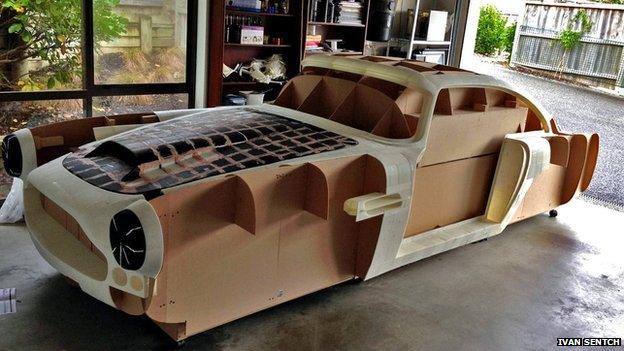Is digital piracy possible on any object?
- Published
'Spotify for 3D printing' launches stream
First it was music, movies and novels, but now everything appears to be at risk of piracy. But with a "Spotify for objects" being set up, is it an opportunity for developers to realise their dreams or is there a big risk of their ideas being taken for nothing?
The proliferation of 3D printing has opened the door to a world where, potentially at least, anything can be made at home and - in turn - anything can be pirated.
The Pirate Bay, found guilty of facilitating illegal downloads, has said that 3D printed items will be the next battlefield, external of piracy.
If something can be downloaded free and made for a fraction of the purchase cost, why would people still go out and buy it?
It would certainly save the shops being so busy in the few weeks before Christmas.

The shell of a 1961 Aston Martin is being painstakingly re-created
There have already been examples of everything from an Aston Martin car being attempted, external to an illusion of an object impossible to create, external being printed, showing that anything is possible, even the impossible.
But this design of the "impossible" object caused the first copyright issue when a designer selling his work spotted a reverse-engineered copy on the same site and issued a takedown notice. It was taken down., external
Under 18 months ago, industry leaders were outspoken about the effects that this technology could have on capitalism.
"I don't think we need a marketplace. It's a sharing world," Bre Pettis, chief executive of 3D printing company Makerbot, said last year.
"We are at the dawn of the age of sharing where, even if you try to sell things, the world is going to share it anyway."
His company was taken over for $403m (£250m) in stock this year. He now sees a place where both the ability to give designs away free and huge opportunities for entrepreneurs can co-exist.
"There are lots of commercial applications," he says now.
"Some of our biggest customers are Nasa and they're making robots to explore space. All sorts of entrepreneurs. There are some people who are trading and making money using 3D printing."
To avoid the risk of piracy that increasing numbers of people are fearing, despite the current lack of commercial applications, a company called Authentise has developed a way to protect the work of the creator.
Developed as both a way to protect and a marketplace, it will offer users the chance to "stream" objects to a printer rather than own the plans outright, lowering the chance the design might get shared.
Specifically "not" - which they write in bold - a digital rights management service (DRM) that film and music industries have now disregarded for the most part, it tries to remove the possibility of reverse engineering to create an exact copy.
"We thought of this concept of the stream, Spotify for 3D printing," says Andre Wegner, founder and chief executive of Authentise.
"We try to strike a balance between environments, [one where] people legitimately have created value and want to protect that or want to monetise that in some way.
"The other is people wanting to use their machinery in ways that they want to, and we should not stop people from using their 3D printers for whatever purpose."
The company tries to do this by watermarking objects.
But some have called this, external DRM by another name and risks not working.
"Regardless of object purpose or intent - should 3D printed files be DRM-free? Yes, of course, unqualified yes," says Cody Wilson, who rose to prominence when he designed and 3D-printed his own gun.
"I don't see aggressive prosecution happening for people sharing these files.
"It's less narrow and there's more ways of evading copyright. I don't see their being as unified a front for attacking it or dividing it."

Supporters of the Pirate Bay website are keen to see its services maintained and even expanded
Though the risks in "physibles" - what some are calling the data required to create objects - piracy are seen as a different problem from the music, film and literature businesses, as Pirate Bay founder Tobias Andersson has already warned.
"The Pirate Bay in its current form can withstand the pressure from quite harmless industries like the movie and music industries," he told TorrentFreak, external.
"But when car, oil, and weapons industries and all the countries that depend on them start to feel threatened, we can't depend on a few people to sacrifice themselves."
The inventor of 3D printing, Chuck Hull, sees very few people actually willing to sacrifice themselves because the technology still lacks the convenience and practicality, particularly for small items.
"It's actually typically more expensive to make those sorts of things by printing than going to Ikea and buying it and that'll probably be the case for some time," he says.
"Most of the products where 3D printing is involved, the printing is only one part of the process.
"They're typically a lot more complex. you're not going to print your automobile or your motorcycle - you might print some of the components - but there are more digital processes in that - and most people won't have the equipment at home to fully manufacture a television set."
Click's Jen Copestake visits the world's largest 3D printing factory in Eden Prairie, Minnesota.
And people are drawing comparisons to the music industry as a good thing, in that global revenues are growing for the first time, external since 1999.
"Did you have a tape deck? Did you have a CD writable drive? You have the capability to record anything," says Mr Pettis.
"How do we exist with all these abilities? We got through it somehow. Now we can share things, it'll be an adventure but we're going to get through."
If 3D printing is to create as big a change to objects as it did to the music industry, creating a world where everything can be pirated, there certainly could be some rough seas for both the pirates and the rights holders ahead.
- Published11 October 2013
- Published15 October 2013
- Published30 September 2013
- Published23 September 2013
- Published20 June 2013
- Published9 October 2013